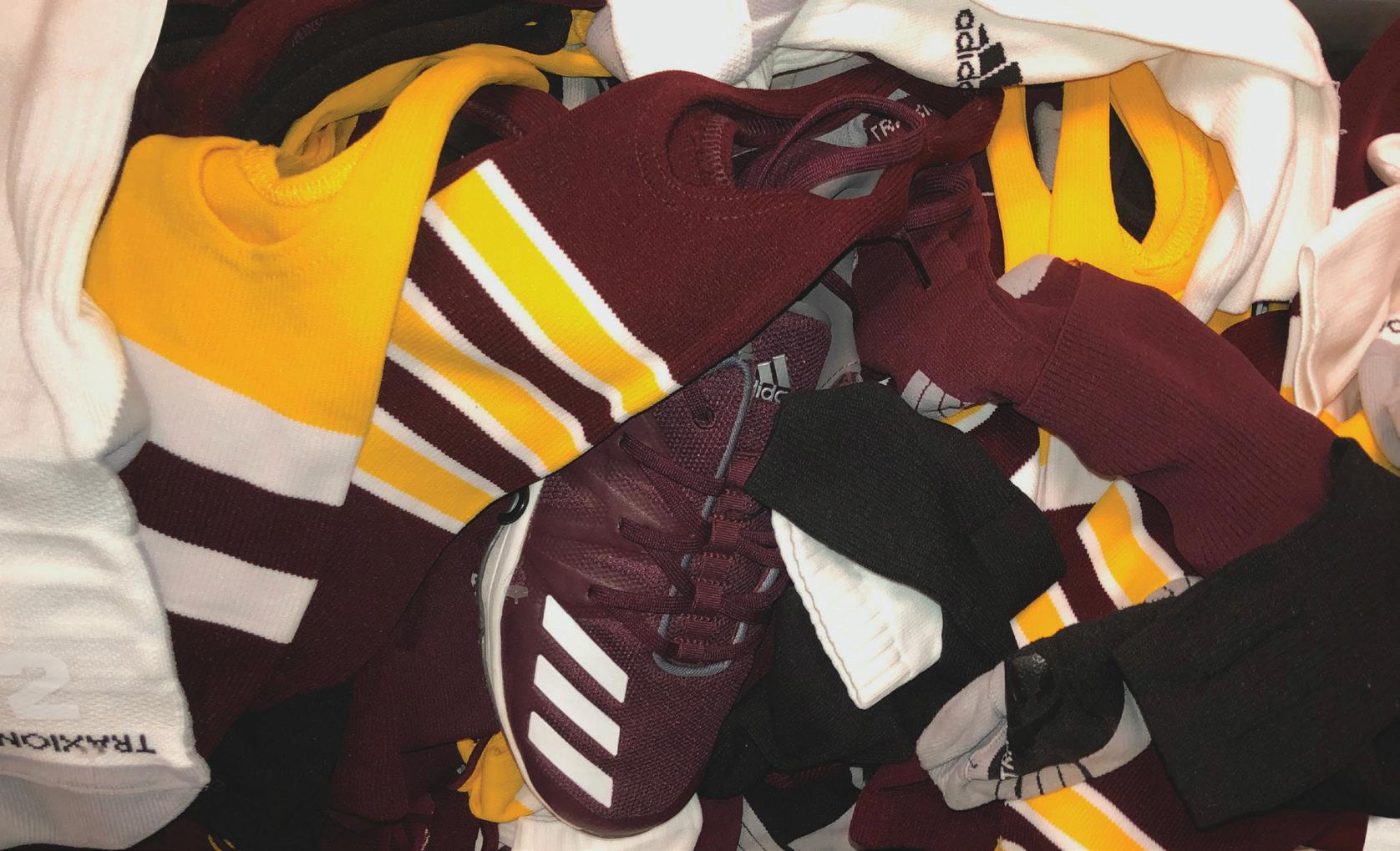Q&A
Plugged in Creatives behind Recordbar Radio speak on the state of the Phoenix music scene by Kiera Riley photos courtesy of Recordbar Radio
T
hey once scanned the crowds, making quick and subtle eye contact with dozens of slightly strung-out faces. Now, their eyes alternate between the dark black pupils of the smiley face beach ball to their right and the eyes of Saints flickering in the prayer candle wicks on a shelf above the turntables. But the DJs, curators and music fanatics running Recordbar Radio believe this is the best possible alternative. At least for now. The project was originally intended to be a hybrid venue, coffee shop and record store, but the pandemic changed its path. Now the organization’s Youtube livestreams bump every subgenre from deep house to drum and bass and feature DJs digging through crates, spinning records and mixing on laptops. Recordbar Radio engineered a digital microcosm for Arizona’s seldom understood underground electronic music community, even as a pandemic picked away at the scene’s very foundation. Nearly a year since its inception, members of the organization take a minute to reflect on where they’ve been and where they’re going. JAKE STELLARWELL — Founder, DJ What led you to the Phoenix music scene? Tell me a little bit about how Recordbar got its start.
I’m almost 40, and I started DJing when I was 15. So, over a decade of promoting
13
parties, doing the whole DIY underground thing. And this was kind of going to be the final peak of all of those years doing that — opening up a place for DJs, producers, musicians, artists, bands to not only gather and share ideas, but also to perform and hang out and create. There's a place in Chicago that I really fell in love with called the Co-Prosperity Sphere, in Bridgeport on the south side… it was just a really, really awesome community space that I thought Phoenix could truly benefit from. I spent 13 years here and worked really, really, really hard developing a scene and showcasing the talent that hadn't really had an opportunity prior… Anyway, I just learned so much about how people work together (in Chicago) and that really wasn't happening here. So, I'm gonna come back and see if I can give this a shot and see if there's a way to bring all of these various disparate, disconnected pieces together. Then the pandemic hit. And so we were like, ‘Why don't we just create a platform that allows people to come and perform, and at least still share their ideas, but we'll just do it as a YouTube livestream?’ Because we didn't have the money or the infrastructure to actually create a true DIY radio station or an independent, internet radio station… We were like, ‘You know what, screw it. Let's just throw this up on YouTube.’ Yeah, that's what we did. And here we are. How would you describe the Phoenix music scene right now?
It's primordial. I know a lot of people say that. Arizona music and Arizona culture have been here forever. And if you look back, that's true, right? But that culture is really… just a Southwest version of Americana, right? We're talking about Southern-fried rock, we're talking about western country and blues, we're talking about metal, and punk and noise. And that's great. Those are all fine scenes. But where music at large is moving is like a whole bunch of different styles of music, representing a whole bunch of tastes, age groups, scenes, communities. And Phoenix just hasn't really done a great job of keeping up with all that. There's also just a lack of resources here. And so there's a lot of just tension when people aren't able to share or feel like they can't share. So you'll have someone who owns a club. And not not only do they own the club, but they also make money as the DJ. And so they don't give anyone any gigs. Or the other person owns a venue. And all they care about is making money. So they don't book any talent that is actually creative, experimental, unique, new, underground, unheard of or local. And they're only bought by talent that sells tickets. The problems are fundamental and deep here. And it's because things are just truly not run by artists, DJs, creatives or collectives that really care about unearthing, showcasing and bridging the gap between talent and scenes. JULIAN FRENCH a.k.a. Jules Quimby — Recordbar Partner, DJ What led you to the Phoenix music scene? What led you to Recordbar?
Well, records had been a lifelong hobby. I've always been purchasing records since I was short pants as Paulie Walnuts would say, (laughs) Sopranos. I managed to hold on to most of the records. And DJing, certainly bands, small-time gigs, here and there through high school and whatnot. And again, just amassing a huge record collection throughout the 90s, 2000s not so much. I switched over to CDs for a while.



